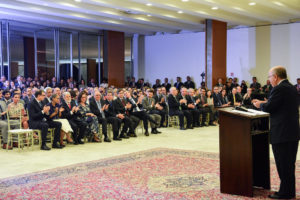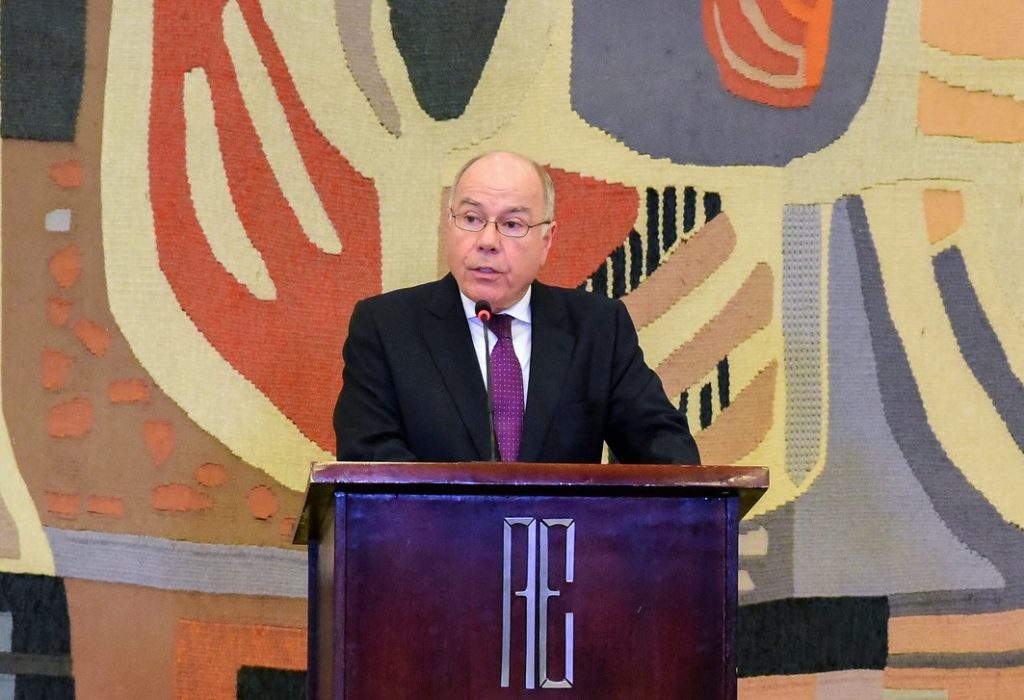São Paulo – Ambassador Mauro Vieira (pictured above) took office as Minister of Foreign Affairs under president Lula’s third term. During the induction ceremony, at the Itamaraty Palace, in Brasília, Vieira spoke on the intense work to be done for the country to regain its leading role in the global community. He also spoke on the importance of resuming bilateral ties and relations with Latin American, Caribbean and African countries.
“Brazil has much to do to rebuild its integration with the world and its own region. We have no time to lose with this work, which belongs to all Brazilians, all powers, and the entire government, but much more, to the Ministry of Foreign Affairs under the experienced leadership of president Lula,” he said. Vieira also highlighted the world is experiencing a global governance crisis, aggravated by the climate emergency. The event took place on Monday (2).
For the ambassador, the three essential pillars of public management will be economic, social, and environmental. Vieira emphasized climate protection and the development of increasingly sustainable actions to guide his work with the ministry. The diplomat also announced Brazil would continue to be a nation rooted in agribusiness, whose intention is to expand agreements for exporting foods to supply the international chain.
Foreign policy
President Lula reaffirmed, in his inauguration speech, his commitment to rebuilding the country and its bridges with the world, recalled the minister. “The first instruction I received from him was to reopen blocked dialogue channels,” he said.

“We will have to rebuild broken bilateral relations and resume constructive leadership in international forums and organizations where we have a distinctive contribution to offer. Brazil could be a reliable partner, distinctive player, leader, and positive force in favor of a more balanced, rational, fair, and peaceful world,” declared Vieira.
Foreign policy, according to the diplomat, “will once again translate into action the vision of a generous country, with more social justice, committed to human rights, conjoined with international law and willing to make a strong contribution to its region and the world.”
Africa & Middle East
Africa, a region from which Brazil had been absent in recent years, will once again become a priority, said the minister. “A dynamic continent, Africa has accelerated its development process; now building a massive free trade area; and will house, in a few years, almost half of the world’s youth,” he declared.
According to the minister, the high-level political dialogue with African countries and their regional organizations will be re-established to deal with challenges such as food security, climate change, trade and investments, and technology exchange. “We will strengthen the South Atlantic Peace and Cooperation Zone,” said Vieira.
Regarding the Middle East, the minister stated Brazil would resume its tradition of good relations with all countries. “We will work to progress in implementing Mercosur agreements with Egypt, Israel, and Palestine, as well as explore the possibility of new negotiating fronts. We will seek diversified partnerships involving products with more added value, investments, and the expansion of exchanges in technology and innovation,” he said.
The minister also spoke about the Palestinian cause. “Concerning Israel and Palestine, two friendly countries to Brazil, we will return to the traditional and balanced position maintained for over seven decades, supporting the solution of two fully viable states safely coexisting side by side and with internationally recognized borders. Our guide in this matter will once again be, as it has always been, international law.”
Latin America and the Caribbean
“Collectively, Latin America and the Caribbean can be a force in favor of multipolarity and benefit to real gains for the countries,” said Vieira. He emphasized Brazil’s return to talks with its own region could mean engagement and dialogue with all political forces to regain the ability to defend its interests and contribute to regional development and stability.
Regarding relations with South America, the minister said the strengthening of Brazil’s ties with Mercosur would be of prime importance during his term. Strengthening ties with Argentina, Uruguay, and Paraguay will be a priority for the Ministry of Foreign Affairs.
Background
This is the second time Mauro Vieira will head the Brazilian Ministry of Foreign Affairs. The diplomat was Foreign minister during Dilma Rousseff’s second term, from 2015 to 2016. He was Brazil’s ambassador to Argentina (2004-2010); the United States (2010-2015); permanent representative to the United Nations in New York (2016-2020), and his last position was ambassador of Brazil to Croatia, from February 2020, until President Luiz Inácio Lula da Silva appointed him to the Ministry of Foreign Affairs.
“It is not common for us to be given a second chance to go back to doing something that was abruptly, involuntarily interrupted. In May 2016, I left the position I am returning to today […]. I now accept the challenge of returning to this place and these tasks, aware crucial changes have taken place in Brazil and the world over the six and a half years since my departure,” said the minister.
Mauro Vieira thanked the president of the Republic for his trust. In addition to Lula, he expressed his gratitude and admiration for the former ministers Celso Amorim and Renato Archer. Former president Dilma Rousseff was also remembered.
Ambassador Mauro Vieira was born in Niterói, in the state of Rio de Janeiro, and is 71 years old. He holds a bachelor’s degree in Law from the Fluminense Federal University and Diplomacy from the Rio Branco Institute, in addition to an honorary Ph.D. in Language from Georgetown University, in Washington D. C., USA.
*With information from Agência Brasil.
Translated by Elúsio Brasileiro




